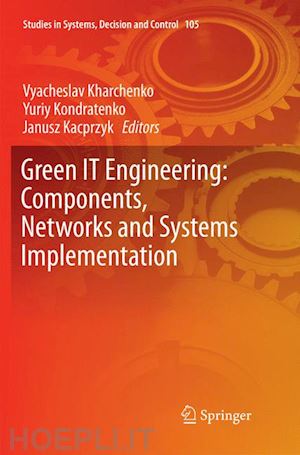
Questo prodotto usufruisce delle SPEDIZIONI GRATIS
selezionando l'opzione Corriere Veloce in fase di ordine.
Pagabile anche con Carta della cultura giovani e del merito, 18App Bonus Cultura e Carta del Docente
This book presents modern approaches to improving the energy efficiency, safety and environmental performance of industrial processes and products, based on the application of advanced trends in Green Information Technologies (IT) Engineering to components, networks and complex systems (software, programmable and hardware components, communications, Cloud and IoT-based systems, as well as IT infrastructures).
The book’s 16 chapters, prepared by authors from Greece, Malaysia, Russia, Slovakia, Ukraine and the United Kingdom, are grouped into four sections: (1) The Green Internet of Things, Cloud Computing and Data Mining, (2) Green Mobile and Embedded Control Systems, (3) Green Logic and FPGA Design, and (4) Green IT for Industry and Smart Grids.
The book will motivate researchers and engineers from different IT domains to develop, implement and propagate green values in complex systems. Further, it will benefit all scientists and graduate students pursuing research in computer science with a focus on green IT engineering.
Vedic Mathematics as Fast Algorithms in Green Computing for Internet of Things.- Technologies for Greener Internet of Things Systems.- Secure, Green Implementation of Modular Arithmetic Operations for IoT and Cloud Applications.- Green Cyber Physical Computing as Sustainable Development Model.- Data Collection for Environmental and Humanitarian Crisis Management.- Influence of software optimization on energy consumption of embedded systems.- Energy Efficiency of 4th Gen Intel ® Core ™ Processor vs 3rd Gen Intel ® Core ™ Processor.- Malicious Software Effect on the Mobile Devices Power Consumption.- Rational Intellectualization of the Aircraft Control: resources-saving safety improvement.- Resource and Energy Optimization Oriented Development of FPGA-Based Adaptive Logical Networks for Classification Problem.- Green Experiments with FPGA.- Green Logic: Green LUT FPGA Concepts, Models and Evaluations.- The Concept of Virtual Manufacturing Enterprise Operation as a Green Complex System.- Green-IT Approach to Design and Optimization of Thermoacoustic Waste Heat Utilization Plant Based on Soft Computing.- G. Resource-oriented approaches to implementation of traffic control technologies in safety-critical I&C systems.- Markov Models of Smart Grid Digital Substations Availability: Multi-Level Degradation and Recovery of Power Resources Issues.











Il sito utilizza cookie ed altri strumenti di tracciamento che raccolgono informazioni dal dispositivo dell’utente. Oltre ai cookie tecnici ed analitici aggregati, strettamente necessari per il funzionamento di questo sito web, previo consenso dell’utente possono essere installati cookie di profilazione e marketing e cookie dei social media. Cliccando su “Accetto tutti i cookie” saranno attivate tutte le categorie di cookie. Per accettare solo deterninate categorie di cookie, cliccare invece su “Impostazioni cookie”. Chiudendo il banner o continuando a navigare saranno installati solo cookie tecnici. Per maggiori dettagli, consultare la Cookie Policy.